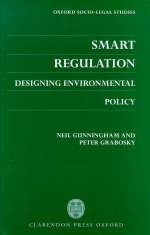
Smart Regulation
Clarendon Press (Verlag)
978-0-19-826857-4 (ISBN)
- Titel ist leider vergriffen;
keine Neuauflage - Artikel merken
Despite decades of policy experimentation, the ultimate goal of efficient and effective environmental regulation has continued to elude policy-makers and regulatory theorists. The less than satisfactory performance of both government and market approaches to environmental protection has led to the introduction of a broader range of policy mechanisms, such as education, information-based strategies, economic instruments and self-regulation. Yet these various policy instruments are usually treated as alternatives to one another rather than as complementary. Drawing from studies in North America, Europe and Australia, the authors show how the design of complementary combinations of policy instruments, tailored to particular environmental goals and circumstances, will produce more effective and efficient policy outcomes. They also confront the critical problem of how, at a time of fiscal constraint and small government, environmental policy might still be designed in ways that improve outcomes both for the environment and for business.
Neil Gunningham is Director of the Australian Centre for Environmental Law, Australian National University, Canberra. In 1997 he was Visiting and Senior Fulbright Scholar at the Centre for the Study of Law and Society, University of California, Berkley. He was previously a Research Fellow at the American Bar Foundation, Chicago. Peter Grabosky is Director of Research the Australian Institute of Criminology, Canberra and a Research Fellow at the Australian Centre for Environmental Law. He was previously Russel Sage Fellow in Law and social Science, Yale Law School, Senior Research Fellow, Research School of Social Sciences, Australian National University, and Visiting Professor, Institute of Comparative Law in Japan, Chuo University.
PART 1: PRACTICE AND POTENTIAL IN ENVIRONMENTAL REGULATION; 1. Introduction:- Regulation, deregulation and beyond; Building on what we've got; Towards a successful policy mix; The structure of this book; How we approached our task: assumptions, evaluation criteria and methodology; 2. Instruments for Environmental Protection:- Introduction; Varieties of Regulatory Instruments; 3. Parties, Roles and Interactions:- Third parties: public interest groups; Third parties: commercial; Governing at a distance; Instrument and institutional interactions; Conclusion; PART 2: REDESIGNING REGULATION: A SECTOR SPECIFIC ANALYSIS; 4. The Chemical Industry:- Introduction; The chemical industry and its environmental impact; The regulatory environment and its shortcomings; Redesigning regulation: towards efficient and effective policy instruments; Towards a broader policy mix; Broader lessons; Conclusion;; 5. The Agriculture Industry:- The agriculture industry and its environmental impact; Characteristics of the agriculture industry; The regulatory environment and its shortcomings; Assessing instrument options: towards efficient and effective agricultural policy; Institutional influences: the role of third parties; Design considerations; Conclusions; 6. Designing Integrative Environmental Policy:- Introduction; Regulatory design processes; Regulatory design principles; Instrument Mixes; Conclusion; Index
| Erscheint lt. Verlag | 24.9.1998 |
|---|---|
| Reihe/Serie | Oxford Socio-Legal Studies |
| Zusatzinfo | bibliography, index |
| Verlagsort | Oxford |
| Sprache | englisch |
| Maße | 138 x 216 mm |
| Gewicht | 735 g |
| Themenwelt | Naturwissenschaften ► Biologie ► Ökologie / Naturschutz |
| Recht / Steuern ► EU / Internationales Recht | |
| Recht / Steuern ► Öffentliches Recht ► Allgemeines Verwaltungsrecht | |
| Recht / Steuern ► Öffentliches Recht ► Umweltrecht | |
| Recht / Steuern ► Privatrecht / Bürgerliches Recht ► Sachenrecht | |
| Sozialwissenschaften ► Politik / Verwaltung ► Staat / Verwaltung | |
| Wirtschaft ► Volkswirtschaftslehre | |
| ISBN-10 | 0-19-826857-2 / 0198268572 |
| ISBN-13 | 978-0-19-826857-4 / 9780198268574 |
| Zustand | Neuware |
| Haben Sie eine Frage zum Produkt? |
aus dem Bereich


